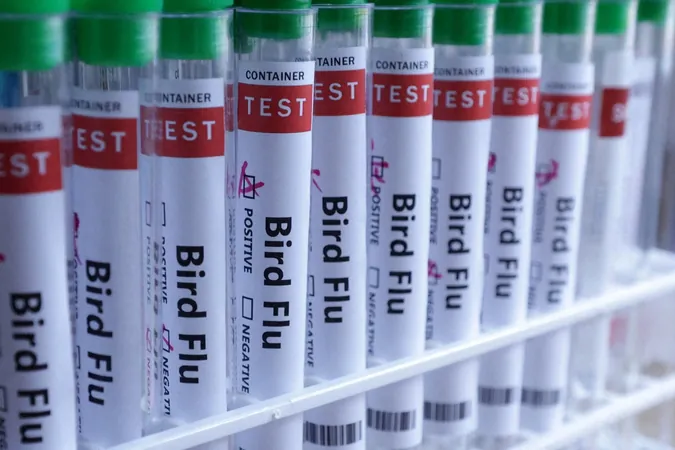
Shocking First: Bird Flu Found in Sheep in England - What It Means for Livestock!
2025-03-24
Author: Sophie
In a startling development, bird flu has been detected in a sheep in England for the very first time, according to government officials. This case was uncovered during routine checks of farmed livestock in Yorkshire, a region already dealing with confirmed instances of the highly pathogenic avian influenza H5N1 in other birds.
While the discovery of H5N1 in sheep is unprecedented in England, it's important to note that other countries have reported similar occurrences in livestock. The government reassured the public that there is no enhanced risk to the UK livestock population at this time.
In response to the positive case, the infected sheep was swiftly culled, and extensive testing was conducted on the remaining flock, which thankfully returned negative results for the avian influenza virus.
Christine Middlemiss, the UK's chief veterinary officer, is emphasizing the need for all livestock owners to stay vigilant for any signs of avian influenza, especially following recent outbreaks. "Strict biosecurity measures are being enforced to prevent any further spread of the disease," she said. Middlemiss urged farmers to maintain high standards of cleanliness and to report any signs of infection immediately to the Animal and Plant Health Agency.
The UK Health Security Agency (UKHSA) reassured the public that avian influenza primarily affects birds, with the risk to human health deemed very low. However, they advise anyone who encounters dead or sick wild birds to avoid direct contact as a precautionary measure.
Dr. Meera Chand, the Emerging Infection Lead at UKHSA, stated, “Globally, we are observing cases where mammals, including sheep, are getting infected with avian influenza A(H5N1). But the current evidence suggests that the strains circulating worldwide do not spread easily to humans.”
The agency has established monitoring protocols in collaboration with other health and food safety bodies to respond rapidly to any potential human cases of avian flu.
Meanwhile, consumers can breathe a sigh of relief; properly cooked poultry and egg products remain safe to eat. The Food Standards Agency has reiterated that avian influenza poses a very low food safety threat, as the virus is typically not transmitted through food sources.
Robin May, Chief Scientific Adviser at the Agency, stated, “We are in close collaboration with Defra, UKHSA, and Food Standards Scotland in light of this discovery in sheep. Our advice remains the same: bird flu does not pose a significant food safety risk to the UK public, and we will continue to monitor the situation closely.”
As the situation unfolds, livestock owners and the general public are advised to stay informed and follow health guidelines to ensure safety across the board. Keep your eyes peeled; the fight against animal diseases is far from over! 🌍💪









 Brasil (PT)
Brasil (PT)
 Canada (EN)
Canada (EN)
 Chile (ES)
Chile (ES)
 Česko (CS)
Česko (CS)
 대한민국 (KO)
대한민국 (KO)
 España (ES)
España (ES)
 France (FR)
France (FR)
 Hong Kong (EN)
Hong Kong (EN)
 Italia (IT)
Italia (IT)
 日本 (JA)
日本 (JA)
 Magyarország (HU)
Magyarország (HU)
 Norge (NO)
Norge (NO)
 Polska (PL)
Polska (PL)
 Schweiz (DE)
Schweiz (DE)
 Singapore (EN)
Singapore (EN)
 Sverige (SV)
Sverige (SV)
 Suomi (FI)
Suomi (FI)
 Türkiye (TR)
Türkiye (TR)
 الإمارات العربية المتحدة (AR)
الإمارات العربية المتحدة (AR)